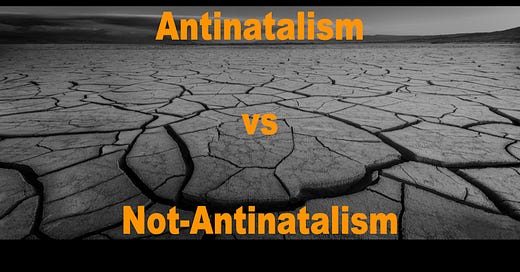Antinatalism vs Not-Antinatalism
The question of how to define antinatalism has occupied a fair bit of airtime and column inches over the years. I first had a proper crack at it in 2019, and further wrestled with it in subsequent videos1 and essays2. In the course of a recent private chat I ended up balking at the wikipedia definition of antinatalism. That led to a mini rant. Then, as if by coincidence, it was announced that the CSAM sciolists are ramping up to answer the question, How to define antinatalism?.
But over the years I’ve shifted from asking that to asking, How to differentiate between antinatalism and not-antinatalism?. I think this question can elicit superior responses.
So, rather than asking how to define antinatalism my approach in this instance is asking how to differentiate between antinatalism and not-antinatalism. Another way of looking at it is trying to conceptualize antinatalism in a way that doesn’t violate the three laws of logic:
1 The law of identity: X = X
2 The law of non-contradiction: X cannot be X and not-X
3 The law of excluded middle: Everything is either X or not-X
The proposition I will defend in this instance is: Antinatalism is the normative conclusion, voluntarily subscribed to, categorically proscribing procreation, in this existential reality.
The statement consists of 4 parts:
1 the normative conclusion, and
2 voluntarily subscribed to, and
3 categorically proscribing procreation, and
4 in this existential reality.
𝄢
1 the normative conclusion
These words confirm antinatalism is a statement regarding how one ought to act, more specifically how one ought to refrain from a particular act, viz., procreation. It's derived from premises rooted in the philosophical branch of normative ethics. As Thaddeus Metz says in his 2012 paper Contemporary Anti-Natalism: “Contemporary anti-natalists aim to show that the balance of what is currently deemed moral common-sense among professional philosophers goes in their favour. They claim to be teasing out the unexpected anti-natal implications of principles that are widely held by academic ethicists.3”
The word the confirms antinatalism is a singular conclusion, not a plurality of views.
This differentiates antinatalism from anything that isn't a normative statement regarding how one ought to refrain from procreation. It also confirms antinatalism isn't merely a recent social media phenomenon.
𝄢
2 voluntarily subscribed to
These words confirm antinatalism is subscribed to and acted upon only on a voluntary basis.
This differentiates antinatalism from anything employing or threatening to employ external compulsion or force to stop any person from having children, such as governments legislating against procreation and the violent rhetoric advocating brutality at will to prevent women from having children routinely espoused by efilists.
𝄢
3 categorically proscribing procreation
These words confirm antinatalism is categorical and universal proscription of procreation no matter what.
This differentiates antinatalism from anything which isn’t categorical and universal proscription of procreation no matter what, such as childfree, birthstrike, and localized population control (eg China’s 1 child policy).
𝄢
4 in this existential reality
These words confirm antinatalism is only concerned with this existential reality and the ethics we've derived from it.
This differentiates antinatalism from different hypothetical realities with different ethics or different realities humanity may find itself existing in. For example, hypothetical realities in which a paper cut is the only harm one can possibly suffer or in which humans have cracked the secret to immortality4.
𝄢
As I said at the beginning my purpose here hasn’t been to define antinatalism. My goal has been to clarify criteria which can be used to differentiate antinatalism from not-antinatalism. In other words, I'm not saying everything grounded in normative ethics, and voluntarily subscribed to, and categorically proscribing procreation, and concerned with this existential reality is definitively antinatalism. I leave open the possibility something could be articulated containing all four elements and not be antinatalism.
I am however saying anything not grounded in normative ethics, or not voluntarily subscribed to, or not categorically proscribing procreation, or not concerned with this existential reality is definitively not-antinatalism. I predict anything lacking any one of those criteria will not be antinatalism on the basis it will violate at least one of the three laws of logic.
𝄢
As an afterthought, this permits me to segue into another question I've been ruminating on since listening to John Williams defend his sperm donation comments—To what extent does a categorical proscription of procreation limit the compatibility of antinatalism and consequentialism?. Seeking to realize the right kinds of outcomes on a case by case basis is antithetical to committing to categorical rules. This may be why consequentialists who want to be known as antinatalists, consciously or otherwise, try to downplay or dismiss antinatalism being conceptualized as a categorical proscription of procreation. As of now I'm inclined to think consequentialism and antinatalism may only be wholly compatible if antinatalism is defined in a way that violates one of the three laws of logic. Perhaps the CSAM sciolists can prove me wrong in their upcoming discussion.
𝄢
I sometimes update my posts. If you want to critique things I say, please screenshot or archive to mitigate against your efforts being made redundant or accusations that I change what I write to avoid criticism. (Last update: 2024 August 11, 08:57 JST)
Given the infinitude of online content, and the value of your precious time, thank you for choosing my tiny corner of the web.
Metz, Thaddeus (2012) Contemporary Anti-Natalism, Featuring Benatar’s Better Never to Have Been, South African Journal of Philosophy, 31:1, 1-9, DOI: 10.1080/02580136.2012.10751763, pg1


